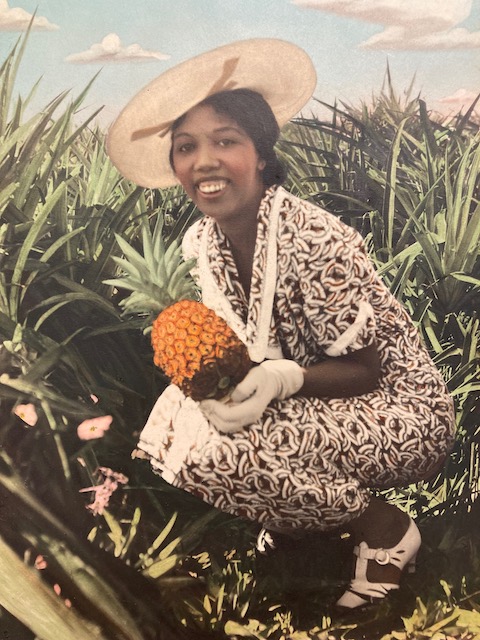
Gwendolyn Fowler at the Dole pineapple field in Hawaii in December 1936. Photo courtesy of Iowa Women’s Archives, University of Iowa Libraries
Sept/Oct 2023 (Volume 15, Issue 5)
By Jerome Thompson
Louise Mays wrote a letter to the Des Moines Register on Dec. 28, 1997. She wrote “I used to belong to the sorority that Gwendolyn Fowler belonged to, Alpha Kappa Alpha. There were people there at her funeral that she had befriended, that she inspired. I just wanted the public to know what kind of woman she was because her obituary didn’t say that…” Gwendolyn Wilson Fowler was, indeed, an interesting Iowan. She was a pioneer among women of color earning a pharmacy degree and registering as a pharmacist in Iowa, she was a world traveler, she served in the Foreign Service in Vietnam in the 1950s, she served on Iowa’s Human Rights Commission, and she was inducted into the Iowa Women’s Hall of Fame.
In the words of her friend, Catherine Williams, from a Des Moines Register article on Feb. 13, 1998, “She really was a classy lady.”
Fowler was born in Dardanelle, Ark., to Fannie Robinson Wilson and Dr. Cornelius Wilson on Dec. 8, 1907. The family moved to Des Moines in 1913 where her father set up a medical practice. Dr. Wilson died in 1916. Gwendolyn attended Bryant Elementary School (Pennsylvania and Grand Avenue by the State Capitol — the site is marked by a plaque and boulder) and West High School (15th and Center streets). Her mother wanted the best education for her daughter and made arrangements for Gwendolyn to attend a preparatory high school on the campus of Rust College in Holly Springs, Miss. Rust College is a historically black college and university established in 1866 by the Freedman’s Aid Society of the Methodist Episcopal Church. Gwendolyn graduated from Rust College in 1926 and returned to Iowa.
Gwendolyn was accepted to the College of Pharmacy at the University of Iowa and transferred to the Des Moines College of Pharmacy, which later became the Drake College of Pharmacy. When she graduated with a pharmaceutical/chemistry degree in 1930; she became one of the first women of color to obtain the degree and likely the first to be registered as a pharmacist only 13 years after the requirement for pharmacy licensing was signed into law by the State of Iowa.
Although highly qualified Gwendolyn was unable to find work in her field possibly because of the Great Depression. She returned to Holly Springs and taught seventh grade for a year before returning to Des Moines. Finding work in Des Moines was tough, but Gwendolyn got a life-changing break when she was hired as a travel assistant for Winnie Ewing Coffin in 1936. Coffin was the widow of Nathan E. Coffin, a Des Moines attorney. The Coffins were world travelers and art collectors. Winnie Coffin was planning travel throughout the Pacific region collecting Asian art for a future museum in Des Moines.
TO READ THE ENTIRE STORY AND OTHER FASCINATING STORIES ABOUT IOWA HISTORY, subscribe to Iowa History Journal.
